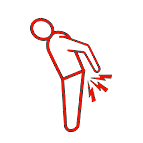
Anal fissure
An anal fissure is a tear in the anus or anal canal's lining (the opening through which stool passes out of the body). The fissure can be painful and may bleed.
What are the signs and symptoms of an anal fissure? Signs and symptoms of an anal fissure include:
- Pain during, and even hours after, a bowel movement
- Constipation
- Blood on the outside surface of the stool
- Blood on toilet tissue or wipes
- A visible crack or tear in the anus or anal canal
- Burning and itching that may be painful
- Discomfort when urinating, frequent urination, or inability to urinate
- Foul-smelling discharge Tests and Treatment
Diagnosis
The following diagnostic tests can be performed to identify Anal fissure.
- Anoscopy
- Flexible sigmoidoscopy
- Colonoscopy: You may undergo a colonoscopy if you:
- Are older than 45 years old
- Have colon cancer risk factors.
- Present symptoms of additional conditions.
- Have additional symptoms like diarrhea or stomach pain.
Treatments
Nonsurgical treatments
- Externally applied nitroglycerin (Rectiv).
- Topical anesthetic creams such as lidocaine (Xylocaine) may help relieve pain.
- OnabotulinumtoxinA (Botox) injection Surgical treatments
Surgery for anal fissures is unlikely unless other treatments have failed. A lateral internal sphincterotomy (LIS) is a procedure that involves making a small cut in the anal sphincter muscle. It relieves pain and pressure on the fissure, allowing it to heal.
Make an appointment right away for consultation on your proctological issue.
Call With Doctor